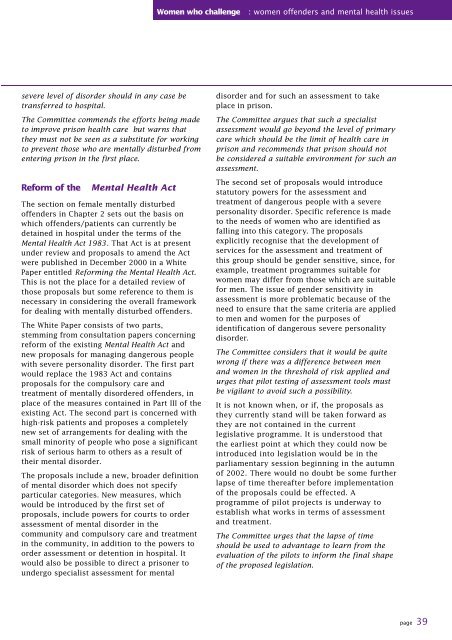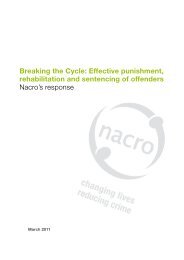Women who challenge - Nacro
Women who challenge - Nacro
Women who challenge - Nacro
- No tags were found...
Create successful ePaper yourself
Turn your PDF publications into a flip-book with our unique Google optimized e-Paper software.
<strong>Women</strong> <strong>who</strong> <strong>challenge</strong>: women offenders and mental health issuessevere level of disorder should in any case betransferred to hospital.The Committee commends the eff o rts being madeto improve prison health care but warns thatthey must not be seen as a substitute for workingto prevent those <strong>who</strong> are mentally disturbed fro mentering prison in the first place.Reform of the Mental Health ActThe section on female mentally disturbedoffenders in Chapter 2 sets out the basis onwhich offenders/patients can currently bedetained in hospital under the terms of theMental Health Act 1983. That Act is at presentunder review and proposals to amend the Actwere published in December 2000 in a WhitePaper entitled Reforming the Mental Health Act.This is not the place for a detailed review ofthose proposals but some reference to them isnecessary in considering the overall frameworkfor dealing with mentally disturbed offenders.The White Paper consists of two parts,stemming from consultation papers concerningreform of the existing Mental Health Act andnew proposals for managing dangerous peoplewith severe personality disorder. The first partwould replace the 1983 Act and containsproposals for the compulsory care andtreatment of mentally disordered offenders, inplace of the measures contained in Part III of theexisting Act. The second part is concerned withhigh-risk patients and proposes a completelynew set of arrangements for dealing with thesmall minority of people <strong>who</strong> pose a significantrisk of serious harm to others as a result oftheir mental disorder.The proposals include a new, broader definitionof mental disorder which does not specifyparticular categories. New measures, whichwould be introduced by the first set ofproposals, include powers for courts to orderassessment of mental disorder in thecommunity and compulsory care and treatmentin the community, in addition to the powers toorder assessment or detention in hospital. Itwould also be possible to direct a prisoner toundergo specialist assessment for mentaldisorder and for such an assessment to takeplace in prison.The Committee argues that such a specialistassessment would go beyond the level of primarycare which should be the limit of health care inprison and recommends that prison should notbe considered a suitable environment for such anassessment.The second set of proposals would introducestatutory powers for the assessment andtreatment of dangerous people with a severepersonality disorder. Specific reference is madeto the needs of women <strong>who</strong> are identified asfalling into this category. The proposalsexplicitly recognise that the development ofservices for the assessment and treatment ofthis group should be gender sensitive, since, forexample, treatment programmes suitable forwomen may differ from those which are suitablefor men. The issue of gender sensitivity inassessment is more problematic because of theneed to ensure that the same criteria are appliedto men and women for the purposes ofidentification of dangerous severe personalitydisorder.The Committee considers that it would be quitewrong if there was a difference between menand women in the threshold of risk applied andurges that pilot testing of assessment tools mustbe vigilant to avoid such a possibility.It is not known when, or if, the proposals asthey currently stand will be taken forw a rd asthey are not contained in the curre n tlegislative programme. It is understood thatthe earliest point at which they could now bei n t roduced into legislation would be in thep a r l i a m e n t a ry session beginning in the autumnof 2002. There would no doubt be some furt h e rlapse of time thereafter before implementationof the proposals could be effected. Ap rogramme of pilot projects is underway toestablish what works in terms of assessmentand tre a t m e n t .The Committee urges that the lapse of timeshould be used to advantage to learn from theevaluation of the pilots to inform the final shapeof the proposed legislation.page 39
















